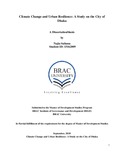| dc.contributor.advisor | Hossain, Dr. Md Shanawez | |
| dc.contributor.author | Sultana, Najia | |
| dc.date.accessioned | 2018-11-06T04:36:53Z | |
| dc.date.available | 2018-11-06T04:36:53Z | |
| dc.date.copyright | 2018 | |
| dc.date.issued | 2018-09 | |
| dc.identifier.other | ID 15162009 | |
| dc.identifier.uri | http://hdl.handle.net/10361/10807 | |
| dc.description | This dissertation is submitted in partial fulfillment of the requirements for the degree of Masters of Development Studies, 2018. | en_US |
| dc.description | Cataloged from PDF version of dissertation report. | |
| dc.description | Includes bibliographical references (page 61-63). | |
| dc.description.abstract | Among all Asian cities, Dhaka is the most vulnerable to climate change impacts having lower adaptive capacity, higher exposure and higher sensitivity. For its huge urban poor population a variable and unpredictable climate can critically restrict livelihood options, hamper daily life, causes damage to health condition and so on. Urban poor are continues to be neglected in research, policy and action for climate change adaptation in the country in comparison to rural or coastal area. The study builds on three propositions: i) To measure the contingent effects of climate change in Dhaka city ii) To explore coping mechanisms for climate change related vulnerabilities in Dhaka City iii) To propose some plans to mitigate these effects. The Climate Resilience Framework places a strong emphasis on how to build resilience for sustainability. It has three main parts; understanding the vulnerabilities, building resilience and sharing knowledge. Based on mixed method discussion of this study focuses on measuring climate change effects and planning to enhance resilience of Dhaka against climate change related vulnerabilities. Research findings show that people living in slum areas suffers most because of climate change. It causes damage in daily life and loss in livelihood. Poor people struggle economically, physically and socially because of the effects of climate change they face in their life. Urban dwellers specially who live in slum areas experience serious harm in health condition such as chikungunya, meningitis, food-borne gastroenteritis as the climate has changed a lot. It is also found that women of marginal group are the worst sufferers of climate change. Similarly it is also found that, there is serious lack in carefulness among the designated local government offices in taking and implementing measures to enhance resilience of the city. To build Dhaka as a resilient city this research suggests multi stake-holder engagement as the preeminent solution. In addition, proper urban planning can play an important role here. The increasing problem of water logging, sewerage and sanitation in Dhaka city can be improved by ensuring pre planed urbanization. | en_US |
| dc.description.statementofresponsibility | Najia Sultana | |
| dc.format.extent | 64 pages | |
| dc.publisher | BRAC University | en_US |
| dc.rights | BRAC University dissertation reports are protected by copyright. They may be viewed from this source for any purpose, but reproduction or distribution in any format is prohibited without written permission. | |
| dc.subject | Climate change | en_US |
| dc.subject | Urban resilience | en_US |
| dc.subject.lcsh | Climatic changes--Bangladesh. | |
| dc.title | Climate change and urban resilience: a study on the city of Dhaka | en_US |
| dc.type | Dissertation | en_US |
| dc.contributor.department | BRAC Institute of Governance and Development, BRAC University | |
| dc.description.degree | M. Development Studies | |

